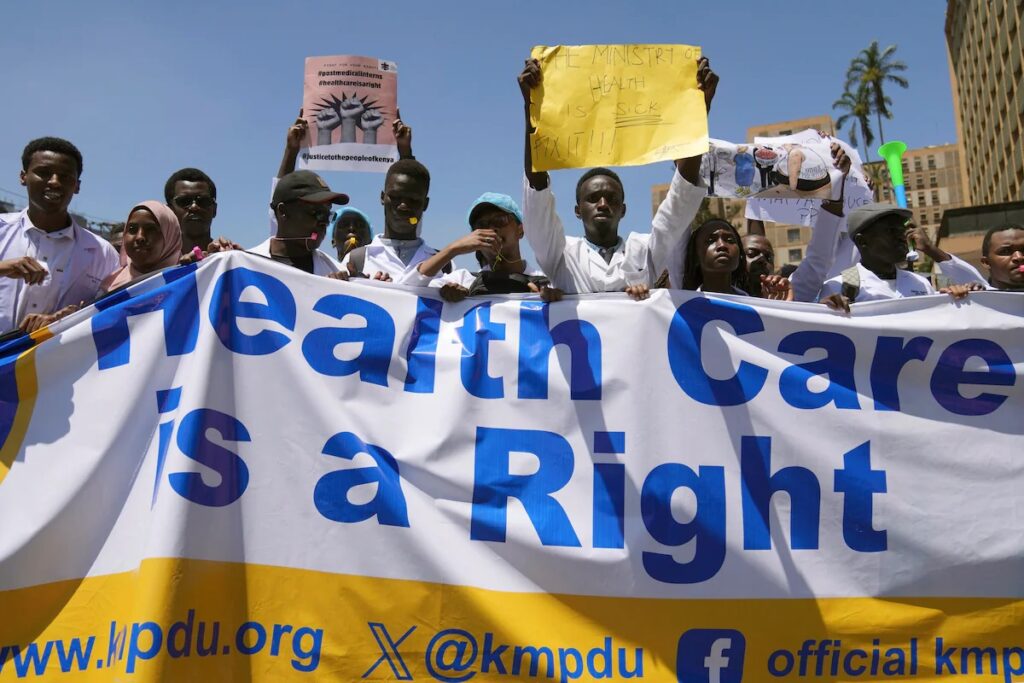- Kenyan doctors have rejected a $18.3 million (KES2.4 billion) offer to return to work.
- The top demands of over 7,000 medics include immediate hiring of trainee doctors, adequate medical insurance coverage for doctors and their dependents, and fixing delays in pay.
- The labour boycott also calls for paying doctors working in public hospitals as part of their higher degree courses.
In a move that further throws Kenya’s healthcare system into a spin, public hospital doctors under the Kenya Medical Practitioners, Pharmacists, and Dentists Union (KPMDU) lobby have rejected a $18.3 million (KES2.4 billion) offer to leave the streets and go back to work.
The latest twist underlines the deepening rift between healthcare professionals and Kenyan officials amid a strike that has now stretched into its third week since March 15.
Representing over 7,000 members, KMPDU initiated the strike to address several critical issues, including the demand for the payment of salary areas dating back to a 2017 Collective Bargaining Agreement (CBA), immediate hiring of trainee doctors, provision of adequate medical insurance cover for doctors and their dependents, and addressing the frequent delays in salary disbursements. The strike also calls for paying doctors in public hospitals as part of their higher degree courses.
The healthcare sector in Kenya, described by its practitioners as underfunded and understaffed, is no stranger to strikes. However, the current labour boycott has highlighted the exacerbated tensions over unmet government promises and contractual obligations.
No resolution in sight for Kenyan doctors’ strike
The government’s inability to hire trainee doctors, as stated by Health Minister Susan Nakhumicha, citing financial pressures, has only added fuel to the fire. With no resolution in sight, the impasse has prompted other health workers, including clinical officers, to join the strike, signalling a united front against what is perceived as governmental negligence towards the healthcare sector.
The $18.3 million offer announced by Felix Koskei, State House Chief of Staff and Head of the Public Service, intended to post eligible medical student interns and provide grants and scholarships for postgraduate education, was seen as a step towards resolution.
However, KMPDU’s outright rejection of this offer, communicated through a stern statement to President William Ruto, signals a deeper discontent beyond financial grievances.
Dr. Abi Mwachi, KMPDU Chairman, cited the betrayal felt by doctors, who in 2017 ended a 100-day strike in good faith, believing in the government’s promises for betterment, a promise they feel remains unfulfilled.
“The doctors of this country did nothing but believe in their government’s promise in 2017, where hence we ended a 100-day strike for the price of a promissory note. It is time to honour that promise,” Dr. Mwachi stated.
The lobby’s secretary general, Dr Davji Atellah, further reinforced the union’s stance, condemning the government’s approach as an act of ‘impunity.’ “We refuse to tolerate impunity! With unwavering determination, our resolve surges. United in purpose, our strike gains momentum, intensifying tenfold as we advance towards a healthcare system rooted in fairness and justice,” declared Dr. Atellah.
Read also: UK deploys $18.86M to Train Healthcare Workers in Kenya, Nigeria, and Ghana
Kenyan doctors abandon hospitals for the streets
The strike has led to severe disruptions in healthcare services across Kenya, with many doctors abandoning hospital wards for the streets in protest. The collective actions of the healthcare workers underscore a desperate cry for a systemic overhaul, a demand for a healthcare system that respects the rights and welfare of its workers and ensures the delivery of quality care to the Kenyan population.
As the deadlock continues, the impact on Kenya’s healthcare system becomes increasingly dire. The strike not only poses immediate health risks to the population but also threatens the long-term viability of the nation’s healthcare system.
The path to a resolution requires more than temporary fixes; it calls for a sincere engagement with the grievances of the medical community and a concerted effort to rebuild trust, a task that seems daunting but necessary for the health and well-being of East Africa’s largest economy.
